|
|
|
Sort Order |
|
|
|
Items / Page
|
|
|
|
|
|
|
| Srl | Item |
| 1 |
ID:
123836
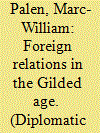

|
|
|
|
|
| Publication |
2013.
|
| Summary/Abstract |
This article examines the influence of Victorian free-trade ideology upon American foreign relations. Victorian free-trade ideology-also known as Cobdenism-gained ground among a small but powerful group of predominantly New England intellectuals. These American Cobdenites became members of the Cobden Club of England, a club that sought to spread free trade throughout the world and was thus seen as a threat to American protectionism. Many of these American Cobdenite members also exerted previously unrecognized influence at both the governmental and nongovernmental level upon Republican and Democratic politics. Cobdenism is nearly absent from American foreign relations historiography. Yet Anglophobic economic nationalists at the time viewed such influence as a transatlantic free-trade conspiracy. By investigating this controversy, I argue that Cobdenism greatly affected Gilded-Age foreign and domestic policies, particularly regarding American attempts at instituting freer trade, maintaining the gold standard, informal imperialism, and developing more amicable Anglo-American relations.
|
|
|
|
|
|
|
|
|
|
|
|
|
|
|
|
| 2 |
ID:
121165
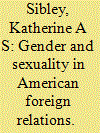

|
|
|
| 3 |
ID:
173664
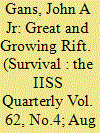

|
|
|
|
|
| Summary/Abstract |
As James Mann makes clear in his engaging dual biography, the world views and weaknesses of Colin Powell and Dick Cheney eventually undermined not just their relationship, but also American foreign relations.
|
|
|
|
|
|
|
|
|
|
|
|
|
|
|
|
| 4 |
ID:
089214


|
|
|
|
|
| Publication |
2009.
|
| Summary/Abstract |
The premise of my presidential address, and now this published version of the talk, is that domestic partisan, the struggle for power at home, has played, and no doubt continues to play, a substantial role in the making and direction of American foreign policy.
|
|
|
|
|
|
|
|
|
|
|
|
|
|
|
|
| 5 |
ID:
132026
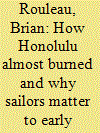

|
|
|
|
|
| Publication |
2014.
|
| Summary/Abstract |
This article argues that in ignoring the exploits of American sailors overseas, diplomatic historians have missed a very important facet of the early republic's foreign relations. It claims that 1898 did not represent any decisive turn to the international, but rather, a moment in which primary control over the nation's foreign relations shifted from maritime nonstate actors to the state itself. To make this case, the essay discusses the form and substance of violent altercations between American seafarers and those they encountered abroad. It reads barroom brawling and harborside tumult as "diplomatic fisticuffs," that is, as sites for the enactment of a distinct, working-class and masculine foreign relations agenda. Politicians, diplomats, and missionaries, however, saw the mighty influence seafaring men exerted overseas as deeply problematic. But even as the American state worked to control rambunctious sailors, late nineteenth-century policy makers discovered that appropriating the violent words and deeds of the nation's nautical class could prove useful in justifying imperial adventure abroad. Thus even as the nation's mariners receded from view overseas, they continued to influence events around the globe.
|
|
|
|
|
|
|
|
|
|
|
|
|
|
|
|
| 6 |
ID:
138315
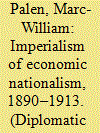

|
|
|
|
|
| Summary/Abstract |
Debunking the common laissez-faire myth surrounding turn-of-the-century American foreign relations allows for a reconceptualization of American imperialism from 1890 to 1913. The Republican Party, the party of protectionism, found itself riven by internal disagreements over the future of the protectionist system and U.S. imperial expansion. From within Republican protectionist ranks arose a progressive wing that increasingly looked beyond the home market for the country’s growing American agricultural and manufacturing surpluses. They did so against staunch anti-imperial opposition not only from American free-trade independents, but also from the Republican Party’s isolationist home-market protectionists, who yet feared or disdained foreign markets and colonial acquisitions. These progressive Republican proponents of empire combined coercive trade reciprocity with protectionism—an expansive closed door—and worked hard to extend American imperial power through informal means of high tariff walls, closed U.S.-controlled markets, and retaliatory reciprocity if possible, by formal annexation and military interventionism when necessary. The American Empire thus arose owing to the imperialism of economic nationalism, not the imperialism of free trade.
|
|
|
|
|
|
|
|
|
|
|
|
|
|
|
|
| 7 |
ID:
145207
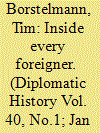

|
|
|
|
|
| Summary/Abstract |
Thomas (“Tim”) Borstelmann is the Elwood N. and Katherine Thompson Distinguished Professor of Modern World History at the University of Nebraska-Lincoln. Previously, he taught for twelve years at Cornell University. He holds a B.A. (1980) from Stanford University and an M.A. (1986) and Ph.D. (1990) from Duke University. His first book, Apartheid’s Reluctant Uncle: The United States and Southern Africa in the Early Cold War (1993) was awarded SHAFR’s Stuart L. Bernath Book Prize. Borstelmann has also published The Cold War and the Color Line: American Race Relations in the Global Arena (2001) and The 1970s: A New Global History from Civil Rights to Economic Inequality (2012), and is a coauthor of Created Equal: A History of the United States (Pearson, 4th ed., 2013).
|
|
|
|
|
|
|
|
|
|
|
|
|
|
|
|
|
|
|
|
|